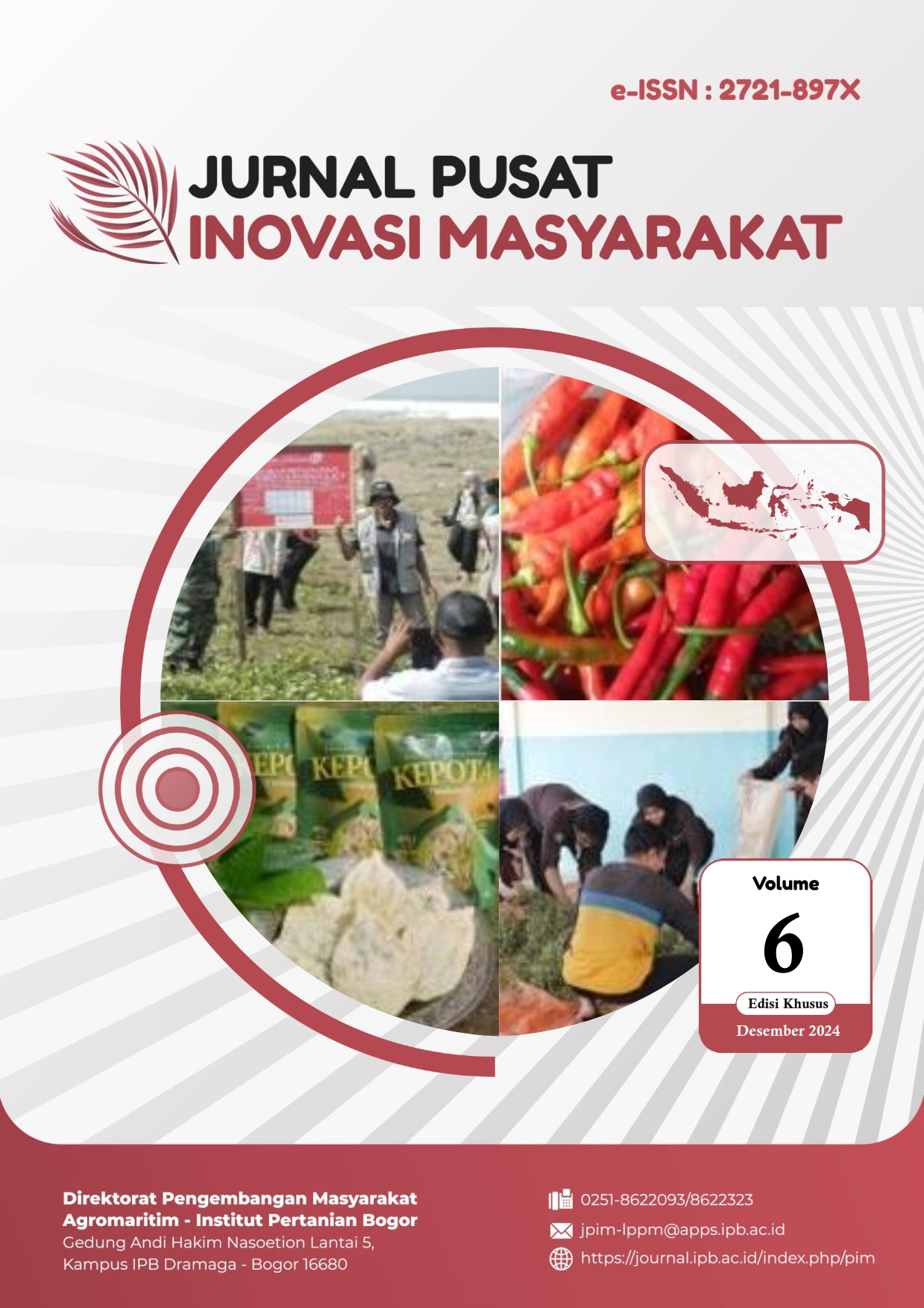Pemanfaatan Ecoenzyme melalui Pembuatan Sabun Cuci Piring Limbah Mawar Guna Meningkatkan Nilai Tambah Mawar di Desa Mriyan, Boyolali
Abstract
The Community Service Program (KKN) in Mriyan Village aimed to transform rose waste into value-added products, specifically ecoenzyme-based dish soap, while raising community awareness about organic waste management. The program involved the local women’s group or Pemberdayaan dan Kesehatan Keluarga (PKK) as the main participants in training on ecoenzyme production and its derivative products. The Implementation strategies included socialization, practical instruction, and assessment using pre- and post-tests to gauge participants' increased understanding. The results showed that participants successfully mastered the techniques of producing ecoenzyme and dish soap, as evidenced by significant improvements in post-test scores. Additionally, the high enthusiasm of the participants indicated the effectiveness of the socialization methods employed. This program not only enhanced the community's skills in waste management but also positively affected the local economy through the possible growth of ecoenzyme-based businesses. The conclusion drawn from this activity is that utilizing rose waste to produce ecoenzyme holds promising prospects for sustainable implementation, provided the local administration and the community work closely together, as well as product diversification.
Downloads
References
Hasibuan MRR. 2023. Manfaat Daur Ulang Sampah Organik Dan Anorganik Untuk Kesehatan Lingkungan. https://doi.org/10.31219/osf.io/yb42t
Imron M. 2020. Manajemen sampah. https://zerowaste.id/zero-waste-lifestyle/ecoenzyme/Pratiwi N. 2020. Degradasi Sampah Organik dengan bantuan Maggot Black Soldier Fly.3(2017): 54–67.
Krisnani H, Humaedi S, Ferdryansyah M, Asiah DHS, Basar GGK, Sulastri SRI, Mulyana N. 2017. Perubahan pola pikir masyarakat mengenai sampah melalui pengolahan sampah organik dan non organik di Desa Genteng, Kecamatan Sukasari, Kab. Sumedang. Prosiding Penelitian Dan Pengabdian Kepada Masyarakat, 4(2): 281-289. https://doi.org/10.24198/jppm.v4i2.14345
Luthfiyyah A, Farabi A. 2010. Konsep eco-community melalui pengembangan eco-enzyme sebagai usaha pengolahan sampah organik secara tuntas pada level rumah tangga. Program Kreativitas Mahasiswa. Bogor (ID): IPB University.
Nurhasanah S, Listyandini R. 2022. Pelatihan Pemanfaatan Sampah Anorganik Menjadi Kerajinan Tangan Bernilai Ekonomis Sebagai Implementasi Pengendalian Sampah Bagi Masyarakat. Jurma. 6(1): 37-45. https://doi.org/10.55927/jpmb.v1i1.619
Megah S I. 2018. Pemanfaatan limbah rumah tangga digunakan untuk obat dan kebersihan. Minda Baharu. 2(1): 50‒58. https://doi.org/10.33373/jmb.v1i1.1180
Pratiwi NI. 2020. Degradasi sampah Organik Dengan Bantuan Maggot Black Soldier Fly. [Disertasi]. Jakarta (ID): Universitas Bakrie.
Wuni C, Husaini A. 2021. Pelatihan Pembuatan Eco-Enzyme Dari Limbah Organik Rumah Tangga sebagai Alternatif Cairan Pembersih Alami. J-ABDI: Jurnal Pengabdian kepada Masyarakat. 1(4): 589‒594. https://doi.org/10.53625/jabdi.v1i4.253
Yunik’ati Imam RM, Hariyadi F, Choirotin I. 2019. Sadar pilah sampah dengan konsep 4R (Reduce, Reuse, Recycle, Replace) Di Desa Gedongarum, Kanor, Bojonegoro. Jurnal Inovasi Hasil Pengabdian Masyarakat (JIPEMAS). 2(2): 81–87. https://doi.org/10.33474/jipemas.v2i2.1122
Yusuf G. 2008. Bioremediasi limbah rumah tangga dengan sistem simulasi tanaman air. Bumi Lestari. 8(2): 136‒144.












